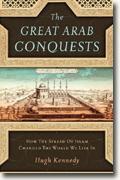The Great Arab Conquests
Hugh Kennedy
book reviews:
· general fiction
· chick lit/romance
· sci-fi/fantasy
· graphic novels
· nonfiction
· audio books
· author interviews
· children's books @
curledupkids.com
· DVD reviews @
curledupdvd.com
newsletter
win books
buy online
links
home
for authors
& publishers
for reviewers

 |
The Great Arab Conquests: How the Spread of Islam Changed the World We Live In Hugh Kennedy Da Capo Press Hardcover 352 pages September 2007 |
|
Anyone who writes about Islam these days is creating both history and headline. It’s unavoidable. Scholars of Islamic culture and history like Hugh Kennedy (Professor of Medieval History at the University of St Andrews, Fellow of the Royal Society of Edinburgh) are uniquely placed to tell a story that will resonate with modern Western readers. Anyone who reads about Islam is scanning for clues as to why the world has gotten itself in its present fix, locked in a religious war between two intractable foes. Kennedy’s book plays into this obsession.
The modern states of Iraq and Iran fell to the Arab militants soon after the death of Muhammed. Kennedy states that there was little popular resistance to their victories, and postulates that Arab rule and taxation may have been, for the common people, “a bargain well worth making.” The picture painted again and again is that the Arabs were wild, simple people with but one idea in mind: to bring an end to religious infidelity and win souls for Islam. Their goal was not based on capitalist greed but on spiritual need. They routed great kings and pillaged great kingdoms because they were not afraid to die. Islamic culture and religion spread across all of Northern Africa and much of the Indian subcontinent, flourishing and retaining a foothold to the current day everywhere but in Spain and Portugal. The Arab armies were not the best equipped, but they had established lines of leadership and were wily fighters who could do battle at night and were no strangers to harsh conditions. Once they wiped out the ruling class of a conquered country, they did not, as might now be imagined, seek to convert all its citizens to Islam. In fact, people in outlying areas might never realize they were being ruled by a new religious regime. But many did convert, particularly to escape taxation or to be part of the new power structure. The Arabs’ conquests were accomplished by armies of men who left their families behind. Their zeal was never, and still is not, ameliorated by any feminine voice. To this day, even the most moderate Muslims are men who are content to keep their women imprisoned by religious restrictions. The Arabs of the 600s, like the jihadists of the 2000s, loom over their world as fierce, violent and, by their nature, hard to beat. Originally published on Curled Up With A Good Book at www.curledup.com. © Barbara Bamberger Scott, 2007 |
|
|
|
 Click here to learn more about this month's sponsor! |
|
| fiction · sf/f · comic books · nonfiction · audio newsletter · free book contest · buy books online review index · links · · authors & publishers reviewers |
|
| site by ELBO Computing Resources, Inc. | |
 Kennedy offers one such clue early in his book, which chronicles the Arab conquests following the death of Muhammed and their larger meaning to the conquered and to the rest of the world. In focusing on the life of Muhammed, Kennedy draws this verse (among others) from the Koran, substantiating the basis of Muslim conquest: “Let those fight in the path of God who sell the life of this world for the other. Whoever fights in the path of God, whether he be killed or be victorious, on him shall We bestow a great reward.” Peaceable Muslims who advocated staying at home and praying for the conversion of the infidels were rebuked. Kennedy suggests that Islamic Arabs early on agreed that it was right to conquer for the purpose of increasing territory and imposing taxes, but not for the purpose of “compulsory conversion.” He puts forth the view that the more violent passages of the Koran stressing “conversion or death” were added later, subsuming earlier, less violent teachings: “It was not until almost two hundred years after the death of the Prophet that the definition of jihad began to be formalized.”
Kennedy offers one such clue early in his book, which chronicles the Arab conquests following the death of Muhammed and their larger meaning to the conquered and to the rest of the world. In focusing on the life of Muhammed, Kennedy draws this verse (among others) from the Koran, substantiating the basis of Muslim conquest: “Let those fight in the path of God who sell the life of this world for the other. Whoever fights in the path of God, whether he be killed or be victorious, on him shall We bestow a great reward.” Peaceable Muslims who advocated staying at home and praying for the conversion of the infidels were rebuked. Kennedy suggests that Islamic Arabs early on agreed that it was right to conquer for the purpose of increasing territory and imposing taxes, but not for the purpose of “compulsory conversion.” He puts forth the view that the more violent passages of the Koran stressing “conversion or death” were added later, subsuming earlier, less violent teachings: “It was not until almost two hundred years after the death of the Prophet that the definition of jihad began to be formalized.”